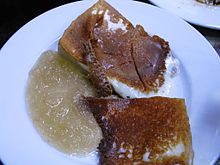- Majorero
-
Majorero Country of origin Spain Region Canary Islands Source of milk Goat Pasteurised No Texture semi-hard Certification PDO Majorero (pronounced ma-ho-RER-o) is a goat milk cheese from Spain. Similar in texture to Manchego, this firm cheese has a milky, nutty flavour that goes well with various pear products. It is pale white in colour, and comes in large wheels. Currently it is protected under European Law with PDO status.
Majorero comes from the island of Fuerteventura in the Canary Islands. The word Mahorero (Majorero) is a Guanche word still used today to describe the people of Fuerteventura. This island has a rich farming tradition, and goats were very important to their economy. It is from the Majorera goat that this particular cheese is made. The goat produces a thick, aromatic and high-fat milk.
Majorero cheese is usually available in three ways: in its natural rind rubbed with oil, rubbed with pimenta, or with roasted gofio. The cheese has a slightly gummy texture. The taste is acidic, with a buttery but not salty taste. This cheese is very versatile, and can be used with pastas, potatoes and many vegetables.
Majorero cheese must be made with unpasteurized milk. After milking, lamb rennet is added and after an hour a curdle develops. This curdle must be beaten and drained to remove the whey. The cheese is then heavily pressed and shaped. Dry salt is rubbed on the top. The cheese must be aired for several days before it can be eaten, or it can be set in dry rooms to age. After ageing, the cheese can be rubbed with oil or gofio to prevent excessive drying and give it different tastes and textures.
See also
History Guanches · Pre-colonial times · Treaty of Alcáçovas · First Battle of Acentejo · Battle of Aguere · Second Battle of Acentejo · Battle of Santa Cruz de Tenerife (1657) · Battle of Santa Cruz de Tenerife (1797) · Spanish transition · Autonomous communityLanguages Mythology Sports Bola canaria · Canarian wrestling · Juego del Palo · Salto del pastor · Open Lanzarote Island · Open Costa AdejeCuisine Almogrote · Canarian arepa · Canarian wrinkly potatoes · Gofio · Malvasia · Majorero · Miel de palma · Mojo · Pasteles · Ropa vieja · Sancocho · Sangria · Tropical beer · WinesMusical instruments Traditions Carnival of Santa Cruz de Tenerife · Carnival of Las Palmas · Bajada (festival) · Cavalcade of Magi · Holy Week · Virgin of Candelaria · Cristo de La Laguna · AkelarreSymbols places of the Canary Islands Category Spanish cheeses Afuega'l pitu • Alpujarra cheese • Cabrales cheese • Casín cheese • Campo de Montalban • Flor de Guía cheese • Gamonedo • Idiazabal cheese • La Serena cheese • Mahón cheese • Mallorca cheese • Majorero • Manchego • Mató • Murcian cheese • Murcian wine cheese • Picón Bejes-Tresviso • Roncal cheese • Tetilla cheese • Torta del Casar • Valdeón cheese • Zamorano cheese the Spain Portal •
the Spain Portal •  the Food PortalCategories:
the Food PortalCategories:- Goat's-milk cheeses
- Spanish cheeses
- Canarian culture
- Fuerteventura
- Spanish products with protected designation of origin
- Canary Islands stubs
- Cheese stubs
Wikimedia Foundation. 2010.


